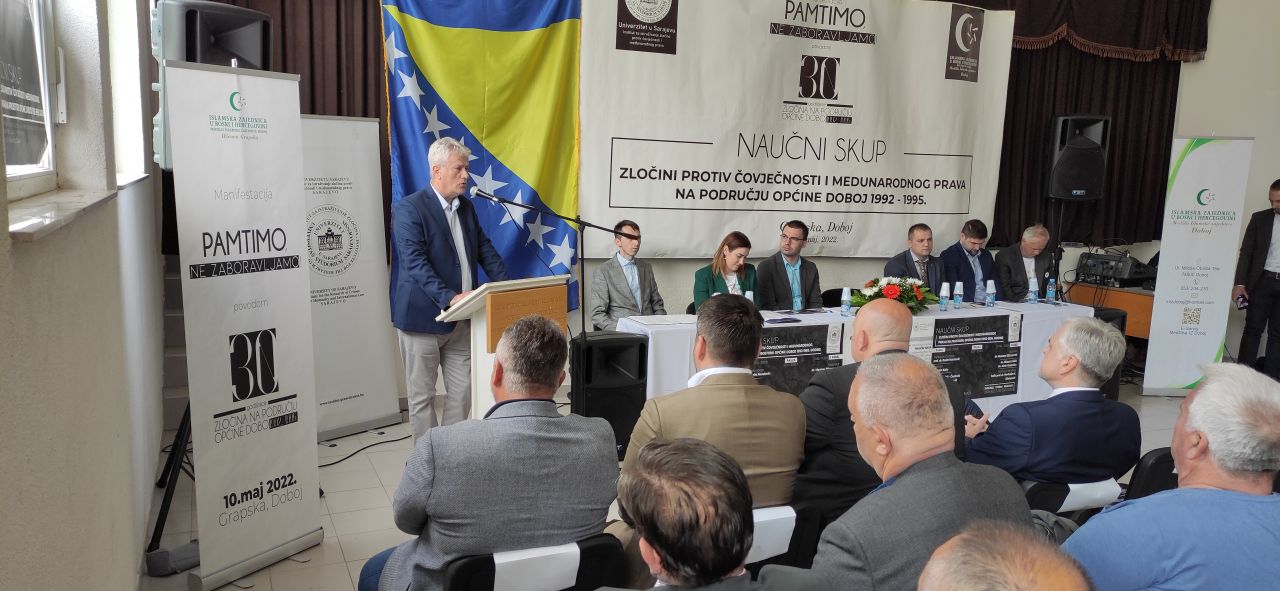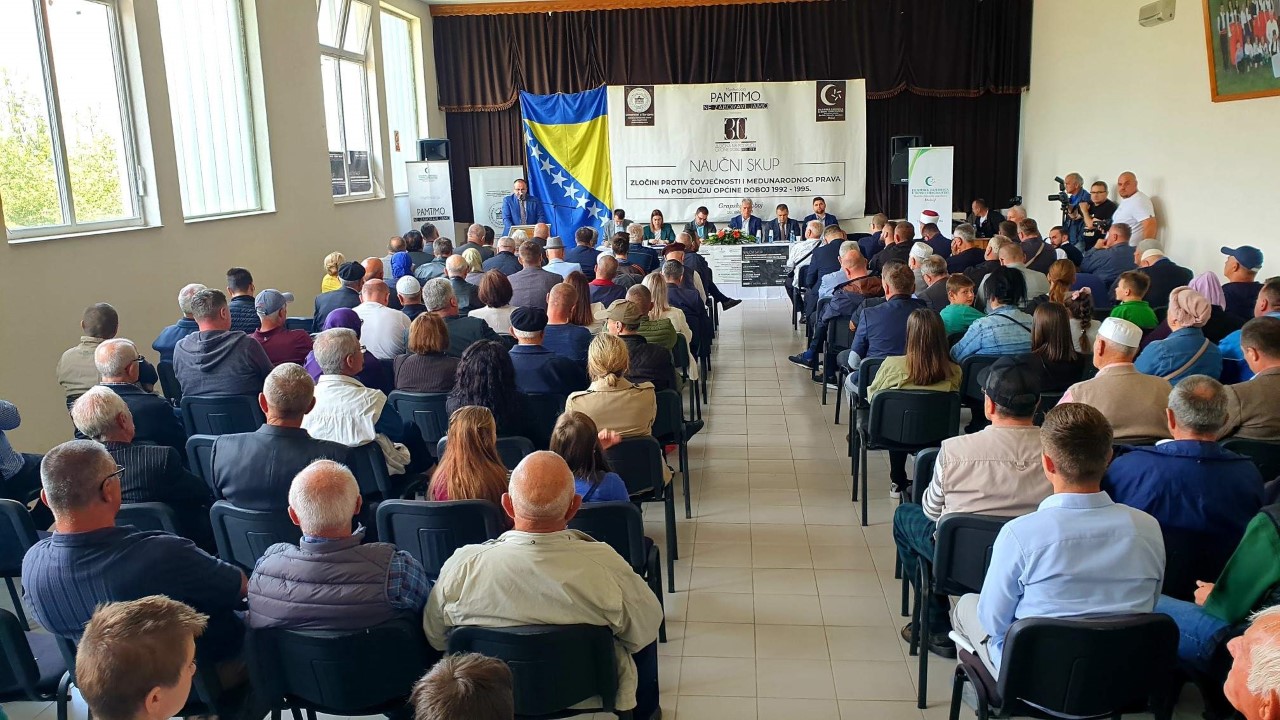The Institute for Research of Crimes Against Humanity and International Law of the University of Sarajevo, with the support of the Mejlis of the Islamic Community (MIZ) Doboj, organized on May 10, 2022, a scientific meeting entitled "Crimes against humanity and international law in the territory of the municipality of Doboj 1992 - 1995. years".
.jpg)
The scientific meeting was held in Grapska near Doboj, a place destroyed in 1992 and the place where crimes were committed against Bosniak civilians who were convicted of genocide before the German judiciary in 1997, which is actually the first verdict for the crime of genocide in Bosnia and Herzegovina for the period 1992-1995. years.
The scientific meeting is part of the "We remember - we don't forget" manifestation, which marks the 30th anniversary of the beginning of the aggression against the Republic of Bosnia and Herzegovina, with a special focus on crimes committed against civilians, primarily Bosniaks.

The gathering was also attended by Reisul-ulema dr. Hussein ef. Kavazovic. After the scientific meeting and the mevlud program that was held in the mosque in Grapska, he called for unity, reminding that our people fought for their identity through different stages, and always preserved their nationality, their language and their faith in the congregation.
- As Bosniaks, we cannot allow our national strength to be wasted and for someone to buy it for cheap money. This means that we have to get together, strengthen our ranks - warned Reisul-ulema. He also said that "any waste will be paid for".
- We know where our qibla is, in which direction we as a people are going, in which direction we are turning. Our spiritual qibla is Mecca, but our earthly qibla is our Bosnia and Herzegovina and our people in it, and other peoples with whom we live together - said reisul-ulema Kavazović.
The scientific meeting was held in two panels, and the opening address was given by prof. Ph.D. Rasim Muratović, Director of the Institute for Research on Crimes Against Humanity and International Law at the University of Sarajevo.
- Today we organized a scientific meeting in cooperation with the Islamic community, which I am particularly pleased about, because the unity of science and religion gives one complete approach. Today we had a number of presenters who looked at the crime in Grapska from a sociological, political and historical perspective - Muratović said, and announced the completion of the study "Crimes in the Grapska area", which is the result of a long-term investigation of committed crimes. He announced that they plan to promote the study at the next commemoration of the anniversary of the crime in 2023.
- "Scientific research has confirmed that genocide was committed in Grapska, and so far we have established that 106 Bosniak civilians were killed here, hundreds of them were expelled and underwent horrific torture in several camps throughout our homeland," emphasized M.Sc. lmir Grabovica, senior associate of the Institute, who is the author of the still unpublished book "Genocide in Grapska". Grabovica reminded that the genocide was also confirmed by a court verdict in 1997 in Germany, and then in Strasbourg in 1999, which was also addressed by Hikmet Karčić, research associate of the Institute for the Islamic Tradition of Bosniaks (IITB).
- This year marks the 30th anniversary of the genocide in Grapska, which was proven in court in Germany, and after thirty years, it shows that there are many untold stories in Bosnia and Herzegovina, and Grapska is one of them. This is an opportunity to show in one micro-locality, a place of returnees, how the memory of the victims of genocide is preserved through such forms of memorialization, including scientific gatherings - said Dr. Karcic.
He added that the Islamic community, that is, the local majlis, has a key role in the aspect of memorialization.
- The Islamic community, majlis and local imams played a key role in the return, but also in memorialization through preserving memories, building monuments and other ways. This shows the great role of the local levels of the organization of the Islamic community in preserving memories, and the example of the scientific gathering from Grapska can be a template for future work on memorialization in smaller communities - he concluded.
- "Scientific research has confirmed that genocide was committed in Grapska, and so far we have established that 106 Bosniak civilians were killed here, hundreds of them were expelled and underwent horrific torture in several camps throughout our homeland," emphasized M.Sc. lmir Grabovica, senior associate of the Institute, who is the author of the still unpublished book "Genocide in Grapska". Grabovica reminded that the genocide was also confirmed by a court verdict in 1997 in Germany, and then in Strasbourg in 1999, which was also addressed by Hikmet Karčić, research associate of the Institute for the Islamic Tradition of Bosniaks (IITB).
- This year marks the 30th anniversary of the genocide in Grapska, which was proven in court in Germany, and after thirty years, it shows that there are many untold stories in Bosnia and Herzegovina, and Grapska is one of them. This is an opportunity to show in one micro-locality, a place of returnees, how the memory of the victims of genocide is preserved through such forms of memorialization, including scientific gatherings - said Dr. Karcic.
He added that the Islamic community, that is, the local majlis, has a key role in the aspect of memorialization.
- The Islamic community, majlis and local imams played a key role in the return, but also in memorialization through preserving memories, building monuments and other ways. This shows the great role of the local levels of the organization of the Islamic community in preserving memories, and the example of the scientific gathering from Grapska can be a template for future work on memorialization in smaller communities - he concluded.
Mufti of Zenica Mevludin-ef. Dizdarević, who was the keynote speaker at the second panel, pointed out in his speech that the process of separating truth from falsehood is important. "Muslims believe that evil does not reside in nations or religions, but in a specific person. We believe that it is extremely wrong to demonize any people or religion with generalizing accusations of "everyone", "everyone" or "always". Criminals try to wrap their crime in cellophane of big ideas. Through scientific and research work, it is also possible to properly address the stigma from the people to individuals, institutions and specific ideologies that are truly responsible for evil, and to amnesty those who are not guilty. He warned that the evil of fascism appears in different forms and ideologies throughout different epochs, and that "it is our religious and civilizational task to recognize it, name it and condemn it as such, regardless of who and against whom it is committed."
Employees of the Institute for Researching Crimes Against Humanity and International Law of the University of Sarajevo participated in the meeting with presentations:
- Mr. Almir Grabovica: "Genocide in Grapska in 1992".
- Assoc. Ph.D. Ermin Kuka: "The role of the Serbian Democratic Party in the occupation of Doboj in 1992",
dr. Muamer Džananović: "Occupation of Doboj and crimes against civilians",
Mr. Alma Hajrić - Čaušević: "Events and crimes in Kotor in 1992",
dr. Amir Kliko: "Emergence of the RS and the transformation of the JNA into the VRS",
Dr. also spoke at the meeting. Hikmet Karčić in front of the Institute for the Islamic Tradition of Bosniaks on the topic: "Destruction of religious heritage in Doboj in 1992 - 1995".
.jpg)
.jpg)
.jpg)
.jpg)
.jpg)
.jpg)
.jpg)
.jpg)
.jpg)
.jpg)
.jpg)
.jpg)
%201.jpg)
